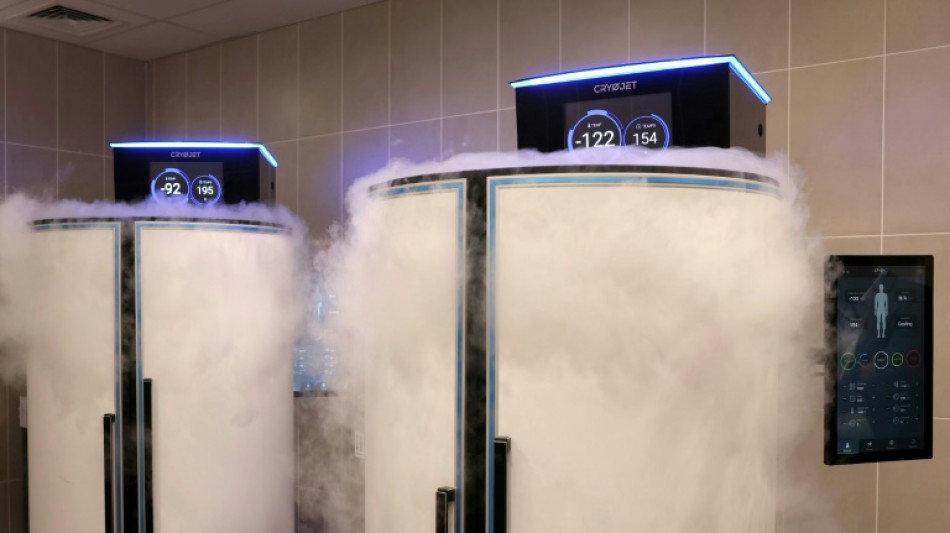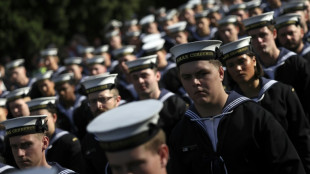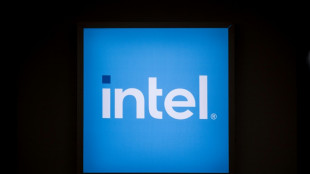
-
 Indian army says new exchange of gunfire with Pakistan
Indian army says new exchange of gunfire with Pakistan
-
Epstein accuser Virginia Giuffre takes own life in Australia: family

-
 Hundreds of buildings damaged, dozens injured in 6.3 Ecuador quake
Hundreds of buildings damaged, dozens injured in 6.3 Ecuador quake
-
India and Pakistan's Kashmir fallout hits economy too

-
 Francis's funeral to be grand farewell to 'pope of the poor'
Francis's funeral to be grand farewell to 'pope of the poor'
-
Pogacar faces defiant Evenepoel at Liege-Bastogne-Liege

-
 Chelsea eye great escape against Barcelona in Women's Champions League
Chelsea eye great escape against Barcelona in Women's Champions League
-
Iran, US to hold new round of high-level nuclear talks

-
 'Energy and effort' pay off for Reds as Blues' woes continue
'Energy and effort' pay off for Reds as Blues' woes continue
-
Albatross and closing birdie lift China's Liu to LPGA Chevron lead

-
 On the horizon? Wave of momentum for high seas treaty
On the horizon? Wave of momentum for high seas treaty
-
Developing countries should fast-track US trade deals: World Bank president

-
 Grizzlies' Morant 'doubtful' for must-win game 4 v Thunder
Grizzlies' Morant 'doubtful' for must-win game 4 v Thunder
-
Trump in Rome for pope funeral in first foreign trip of new term

-
 Trump says Russia-Ukraine deal 'very close' after new Kremlin talks
Trump says Russia-Ukraine deal 'very close' after new Kremlin talks
-
US rookies lead PGA pairs event with McIlroy and Lowry in hunt

-
 Trump tariff promises get a reality check
Trump tariff promises get a reality check
-
Warriors coach Kerr 'relatively optimistic' injured Butler will play game 3

-
 Postecoglou hopes 'Stonecutter's Credo' can inspire Spurs
Postecoglou hopes 'Stonecutter's Credo' can inspire Spurs
-
PSG lose unbeaten Ligue 1 record ahead of Arsenal showdown

-
 Venezuela accuses El Salvador president of 'human trafficking'
Venezuela accuses El Salvador president of 'human trafficking'
-
Own goal takes Sundowns to African final against Pyramids

-
 Scores of buildings damaged, 20 injured in Ecuador quake
Scores of buildings damaged, 20 injured in Ecuador quake
-
US stocks extend rally as market eyes busy calendar next week

-
 Pope's death triggers surge of disinformation he fought against
Pope's death triggers surge of disinformation he fought against
-
Rovanpera takes control of Rally Islas Canarias

-
 Zelensky insists Crimea is Ukrainian as US envoy meets Putin
Zelensky insists Crimea is Ukrainian as US envoy meets Putin
-
Patel and Mendis help Sunrisers beat Kings in Dhoni's 400th T20

-
 Copa del Rey ref statements 'unacceptable': Real Madrid after boycotting final build-up
Copa del Rey ref statements 'unacceptable': Real Madrid after boycotting final build-up
-
Insurance CEO's accused killer pleads not guilty to federal murder charges

-
 FBI arrests Wisconsin judge for shielding undocumented migrant
FBI arrests Wisconsin judge for shielding undocumented migrant
-
Brazil ex-president Collor de Mello jailed for corruption

-
 Zelensky insists Crimea 'belongs' to Ukraine as US envoy meets Putin
Zelensky insists Crimea 'belongs' to Ukraine as US envoy meets Putin
-
Real Madrid boycott Copa del Rey build-up over referee complaints

-
 Trinidad and Tobago votes for parliament, PM, with opposition in lead
Trinidad and Tobago votes for parliament, PM, with opposition in lead
-
IMF chief hails 'constructive' Spring Meetings held under tariff uncertainty

-
 Iran FM Araghchi in Oman ahead of nuclear talks with US
Iran FM Araghchi in Oman ahead of nuclear talks with US
-
Dozens of buildings destroyed, 20 injured in Ecuador quake

-
 Young Barca must 'enjoy' Real Madrid Copa final fight: Flick
Young Barca must 'enjoy' Real Madrid Copa final fight: Flick
-
Pakistan and India border closure separates families

-
 Brazil's Bolsonaro 'stable' after post-surgery setback
Brazil's Bolsonaro 'stable' after post-surgery setback
-
Catholics in secular Cuba hail Francis as 'bridge'

-
 US envoy Witkoff, Putin discuss 'possibility' of direct Russia-Ukraine talks
US envoy Witkoff, Putin discuss 'possibility' of direct Russia-Ukraine talks
-
Community seeks answers after French school knife killing

-
 German prosecutors seek jail terms in VW 'dieselgate' trial
German prosecutors seek jail terms in VW 'dieselgate' trial
-
Sabalenka makes winning start at Madrid Open

-
 EU, US should de-escalate and negotiate trade deal: IMF Europe director
EU, US should de-escalate and negotiate trade deal: IMF Europe director
-
Russia accuses Ukraine of killing general in car bombing

-
 Emery wants FA Cup glory and Champions League berth for Villa
Emery wants FA Cup glory and Champions League berth for Villa
-
Buildings destroyed, one injured in Ecuador quake


From ice baths to osteopaths: unproven therapies at the Olympics
The Paris Olympics have been a showcase not only for athletic prowess but also for therapies such as ice baths and osteopathy which have little scientifically proven medical value, according to experts.
The Olympics have long been a fertile ground for questionable medical treatments, as athletes seek out every way possible to improve their performance and tamp down their pain.
"In sport there is a lot of propaganda for all kinds of 'alternative medicine' -- there is a lot of demand from athletes," French neurologist and pain specialist Didier Bouhassira told AFP.
At the Rio Games eight years ago, cupping was the latest pseudoscientific fad. Though praised at the time by athletes such as US Olympic swimming great Michael Phelps, there is little scientific evidence that applying heated cups to the skin has any more benefit than a placebo.
For this year's Games, which kicked off in Paris on Friday, ice has been all the rage.
Cryotherapy -- which includes cold-water swimming, ice baths and more advanced cooling chambers -- is touted to help athletes recover after vigorous exercise.
- The new ice age -
According to a recent editorial published in the British Journal of Sports Medicine, the federations taking part in the Paris Games together requested more than 16,000 tons of ice -- at a cost of 2.5 million euros ($2.7 million).
No vendor was able to supply such a massive amount of ice, so the Olympics will have to make do with 650 tons, the editorial said. That is still 10 times more than was required at the Tokyo Games only three years ago.
The editorial's authors criticised the routine use of cryotherapy for athletes between training sessions.
While ice baths can treat some conditions, such as heat stroke, athletes often use it "to obtain benefits which are not evidence-based," they wrote.
"Ice could have the opposite effect to that expected such as delayed tissue regeneration or impaired recovery."
The authors also stressed the environmental impact of producing, transporting and storing such vast amounts of ice.
- 'Long way from science' -
Another alternative medicine sought out by athletes -- osteopathy -- is no newcomer to the Olympics.
Osteopaths are on the staff of federations and integrated into the teams at the official Olympic clinic which monitors athletes daily.
But osteopathy, which promises to restore health through manipulations of the body, has little scientific basis and its effectiveness remains hotly contested.
Studies with rigorous methodology have found that broad swathes of the discipline -- such as "cranial" or "visceral" osteopathy -- simply have no effect.
Other osteopathic manipulations, which hew closer to those done by physios, appear to have no particular advantage over conventional, evidence-based physiotherapy.
A randomised clinical trial published in JAMA Internal Medicine in 2021 compared the effect of osteopathic manipulations with "sham" treatments such as light touching in 400 patients with back pain.
The difference between the two was "likely not clinically meaningful", the study said.
Osteopaths offer athletes a feeling of "well being without curative properties", said Pascale Mathieu, president of France's council of physiotherapists.
Mathieu emphasised she was not too worried about osteopathy being given a showcase at the Olympics, where routine care is often a mix of physiotherapy and osteopathy.
"What I'm really fighting for is to prevent osteopathy from entering hospitals," she said.
Some companies have also been accused of using the Olympics to sell products of dubious medical value.
French pharmaceutical giant Sanofi came under criticism for promoting a "pain-relieving" patch called Initiv in the run-up to the Games.
Advertised with the support of athletes such as French Olympian Kevin Mayer, Sanofi says the patch has particles which reflect infrared energy emitted by the body towards a particular area to relieve pain.
Sanofi told AFP that a clinical trial of the patch had been "received favourably by the scientific community".
But pain specialist Didier Bouhassira was not convinced.
"A product is being touted as a miracle, but it's pure PR and a long way from science," he said.
Th.Berger--AMWN



